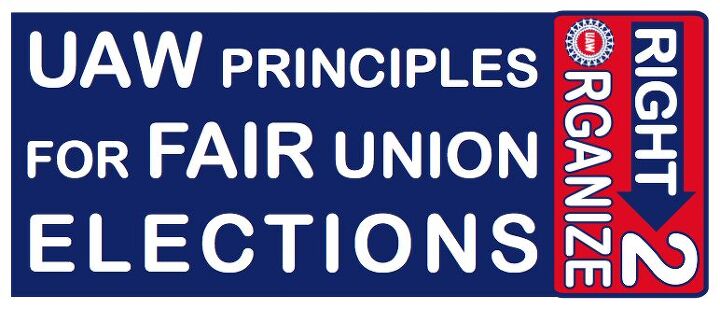Between The Lines: The UAW's Principles For Fair Union Elections
The UAW today released its complete “Principles For Fair Union Elections” [ full PDF here], the document that it wants every transplant auto manufacturer in America to sign ahead of its organizing campaign which kicks off later this month. With so-called “card check” legislation dead in congress, the UAW hopes to shame foreign automakers who manufacture vehicles in America to guarantee certain concessions to the union that, having helped kill off its Detroit “partners,” now owns large stakes in the bailed-out successors to GM and Chrysler.
In the past the UAW has failed to organize a number of transplant factories, including Nissan’s Tennessee plants and Toyota’s Kentucky factory, and the introduction of these principles ahead of the next organization attempt signal’s the UAW’s perspective that “manipulation” by management prevented UAW organization in transplant factories. If bosses from Nissan, Toyota, Subaru, Honda, Volkswagen, BMW and Mercedes don’t sign onto these principles, they will be on the menu for the UAW’s new campaign… but are the principles worth agreeing to? Let’s take a look…
The UAW clearly knows it’s going into this fight with a likeability deficit, as its states in the preamble to its principles that
The UAW of the 21st Century inhabits a global economy, therefore, the union must be fundamentally and radically different from the UAW of the 20th Century.
The preamble goes on to tout the UAW’s commitment to the success of its “partners,” at which point it immediately falls into a credibility gap. After all, the UAW may have changed its perspective in regards to its major partners, GM and Chrysler, but only because it owns large equity stakes in the two automakers, thanks to its privileged position in their government-run bankruptcies. In regards to Ford, the UAW’s largest “partner” in which it owns no equity, the UAW has trampled on decades of “pattern bargaining” (in which the union negotiated the same agreement with all three Detroit automakers) by forcing Ford to give concessions that the union has not asked for from GM and Chrysler. It can not be denied that the 21st Century UAW has not been a fair partner to firms like Ford, let alone Toyota, which it only recently stopped picketing for a NUMMI pullout that can only be fairly blamed on GM.
The preamble then calls upon automakers to sign the principles attached as a way of “embracing the fundamental change” that the UAW claims it has set an example of. The union alleges that the current framework of labor law “does not protect the rights of workers to freely decide whether or not to join the UAW,” a conclusion that would be better worded as a piece of ipso facto: national labor laws have not resulted in UAW organization of the transplant factories. That logic also applies well to the UAW’s first principle, which states
The right to organize a free trade union is a fundamental, human right.
As, of course, is the right to not organize. The UAW has recently embraced high-minded rhetoric to support its agenda, but the talk conceals a pretty significant issue: the UAW is hardly a neutral party in all this. Yes, organizing is a right, but as the list of principles wears on, it becomes clear that the union isn’t any more interested in a level playing field for organizing than the transplants are. Without card check, the odds are skewed somewhat towards the transplants, but under the UAW principles, things skew heavily towards the union… to the extent that they imply not merely that the NRLB fails to protect workers, but that transplant employers violate National Labor Relations Board rules codified under the Taft-Hartley Act.
Principle numbers two, three and four state that
- Employees must be free to exercise the right to join a union… in an atmosphere free of fear, coercion, intimidation or threats
- Management must clearly articulate that if workers choose to unionize, there will be no negative repercussions from the company.
- Management will clearly articulate that it does not promise increases in pay or benefits if workers choose not to unionize
However, all three of these principles are already protected by the Taft-Hartley act, which [accord to a quick glance at Wikipedia] guarantees that
employers have a constitutional right to express their opposition to unions, so long as they did not threaten employees with reprisals for their union activities, or promise benefits as an inducement to refrain from them
Implying that transplant managers deny their employees these basic rights is not only a slur on these companies which employ thousands of Americans, it’s also deeply hypocritical. After all, UAW members recently filed an NRLB complaint against the UAW for forcing 40 percent of the Orion Assembly Plant to take a 50 percent pay cut. TTAC has heard of no such complaints against the transplants. So who do transplant workers need to worry about violating labor laws, their employers or the UAW?
Jumping ahead to principle number seven, it’s absolutely clear what attitude the UAW is taking into this campaign. Though principle seven demands
No disparaging the other party,
the UAW’s second, third, and fourth principles are clear disparagements of the foreign automakers, implying as they do that violations of Taft-Hartley are commonplace in their workplaces. Furthermore, the principle seeks to freeze management’s ability to tell its employees the truth about the union by demanding that transplants
should acknowledge that the other party is acting in good faith with good intentions.
Even though the union’s history (distant and recent) suggests that the UAW looks after itself (specifically its leaders). If transplant factory managers simply tell the truth about the UAW’s ongoing NLRB dispute with its own members, it would risk violating this principle as well as principle number four (as workers could reasonably expect some kind of wage decrease under union representation).
Taking the speech-chilling one step further, principle six calls for management to not only not tell the truth about the UAW, but to actively disavow denunciations of the UAW by members of the plant community. The principle reads
Management will explicitly disavow, reject and discourage messages from corporate and community groups that send the message that a union would jeopardize jobs. Likewise, the UAW will explicitly disavow, reject and discourage messages from community groups that send the message that the company is not operating in a socially responsible way.
Which is convenient, considering the UAW just wrapped up a year-long campaign of disparagement against Toyota. But it also asks companies to actively create conflicts between itself and its workers and their families and community by forcing them to work against every interest except the union’s.
But the greatest overreach by the UAW, and the issue which will likely keep most (if not all) transplants from signing these principles is number five, which guarantees
Equal access to the electorate
During the course of a union representational campaign, employees will have the opportunity to hear equally from both the union and management regarding this issue. There will be no mandatory meetings of employees on the issue of unionization unless the UAW is invited to participate in the meetings. Written and oral communications must be equal. The union must be granted the same ability as the employer to post campaign material.
But transplant factories in “right-to-work” states typically have no-solicitation policies, as is the right of any private property owner. Transplants are not legally obligated to offer the union any access to its property, let alone enforce a kind of “fairness doctrine” in its workplace. As long as no-solicitation policies were in place prior to an organizing campaign and are enforced equally with non-union solicitors, these bans do not create an unfair organizing environment.
The union’s concluding principles guarantee third-party conflict resolution, a secret ballot election (as already mandated by law), bargaining (as is standard union-management practice) and a commitment to “partnership in mission.” But in sum, the UAW asks the transplant factories to give up several legal rights and offers little in the way of credible concessions.
The problems facing the UAW’s organizing campaign are fairly simple: first, the UAW can not reasonably promise workers better pay, and indeed the evidence suggests that UAW representation would eventually worsen the workers’ pay rate. Second, the union projects an image of itself as a “21st Century UAW” that is distinct from its past practices, when that image clearly does not comport with reality. Finally, the union asks companies to give up major concessions not required by law, and requires them to not educate their workers about the reality of the union’s past and present for fear of “disparaging” the UAW.
What’s especially galling about these principles is that they would have been largely unnecessary if the union-backed “card check” legislation had been passed into law by the previous congress. Because our elected representatives failed to approve that legislation, the UAW is demanding that private companies effectively enforce it in the name of “democracy.” Which is not at all how democracy is supposed to work.
More by Edward Niedermeyer
Latest Car Reviews
Read moreLatest Product Reviews
Read moreRecent Comments
- Jeff Maybe one day automatic braking will be better sorted out but as others have stated there are too many false alarms and those false alarms could get one rear ended. I agree about the tire pressure monitoring systems when the batteries go out on the sensors they don't work and they are never meant to last forever. Just buy a good tire gauge and learn how to check the tire pressure and put air in your tires.
- Carson D The funding is so they can travel to China to find manufacturers for their parts.
- Carson D 1996 OBD-II was a good set of regulations. Everything after that has been a net negative.
- ABC-2000 I just got a 2024 Crosstrek, first car for me that require 6000 K or 6 month service, I have been told I better follow that schedule if i actually want to keep it.In the last consumer reports survey, it was the only car that got 99 points for reliability, let's hope they are right (:-)
- Jeff I am going to agree with Tim knobs and buttons but I realize that is low tech but much safer than scrolling thru a screen to reset your interior temperature or to turn off the radio. Also bring back the mechanical parking brake instead of the electronic one.


































Comments
Join the conversation
"Here are the rules of the game I just made up. You have to follow the rules. I will not."
Thank you for giving me your truth about cars.We need as much as we can get ,so here's some more. The UAW ,while bloated and unresponsive to its members,has never operated the R&D Dept,nor the accounting dept,nor the executive planning dept,and its very generously compensated executives of the B-3. These individuals are ALL innocent victims of the dreaded "Crappy Car Fairy".It affected only U.S. makers but not foreign car makers (Except Suzuki.). Be it an Aspen, Aztec,or Tempo, they all began life as the inspired creations of B-3 execs (As they golfed magnificently.) only to be foiled by this dreaded being. The Japanese knew the crappy car fairy would not venture down to the Southern U.S.,as she was always on a diet.There they could open factories operated with burnt out Wal-Mart employees,or those unemployed since the Civil War.Why that Toyota has managed to open new plants paying 50% above the prevailing wage (Usually close to minimum.Southerners love to work more for less pay.They pride themselves on it.).Korea banished the crappy car fairy,by working so,so hard.Don't speak of the their industrial death/accident rate 2x that of the U.S.'(4x that of Japan's! Take that, Japan!).In addition to enjoying protectionist barriers to U.S. made goods,and subsidized defense,courtesy of our defense industry.After all, how could S Korea's chaebols ever manage to make anything half as good as Dear Leader's Taepodong WMD? I'm sure if that uppity UAW(Get it together,fools!) let our exponentially gifted auto execs golf to the best of their ability,everything would be fine.